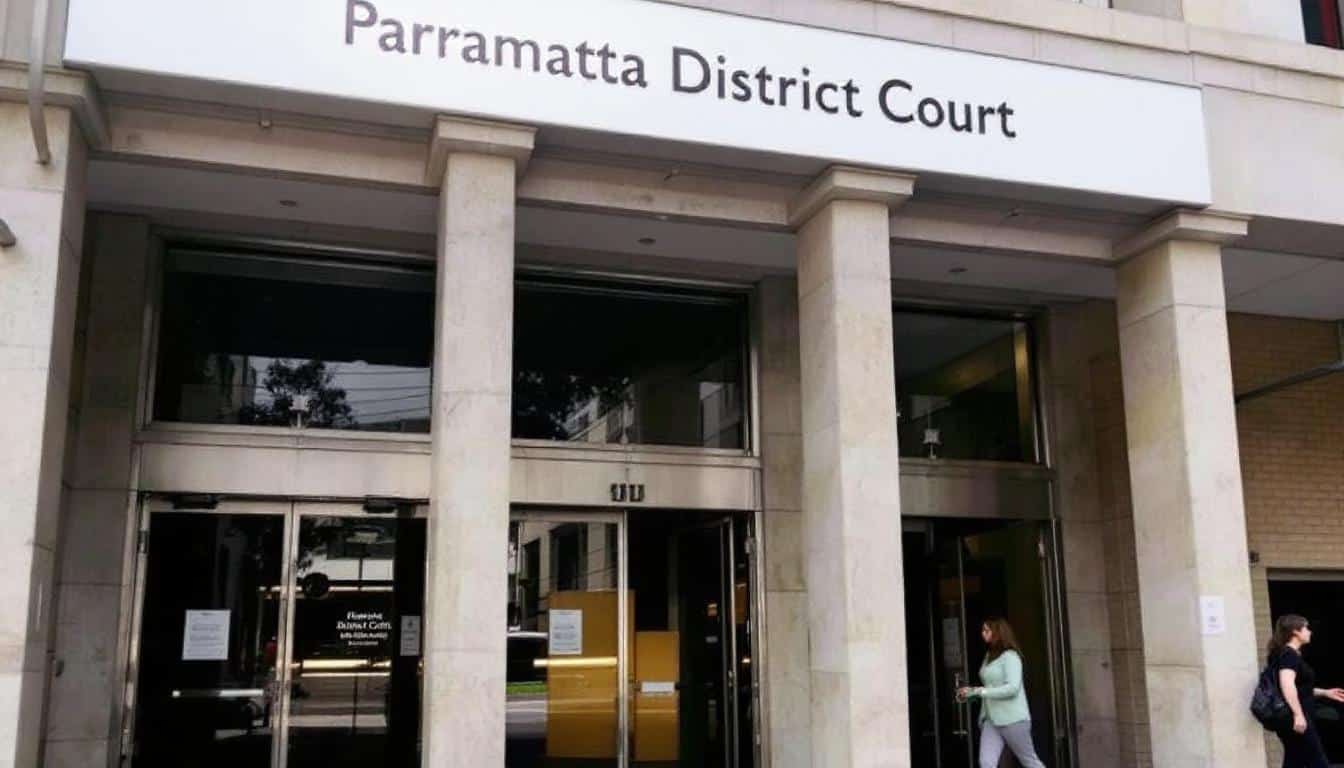At Jameson Law, we understand the importance of navigating the legal system effectively. The Parramatta District Court plays a crucial role in New South Wales’ justice system, handling a wide range of criminal and civil cases.
In this guide, we’ll explore the court’s history, structure, and practical information for visitors. Whether you’re a legal professional or attending court for the first time, this comprehensive overview will help you understand and navigate the Parramatta District Court with confidence.
The Rich History of Parramatta District Court
Establishment and Early Years
The New South Wales Local Court traces its origin to the bench of Sydney magistrates established by Governor Phillip in the late 18th century. This historical foundation laid the groundwork for the development of the judicial system in the region, including the establishment of courts like the Parramatta District Court.
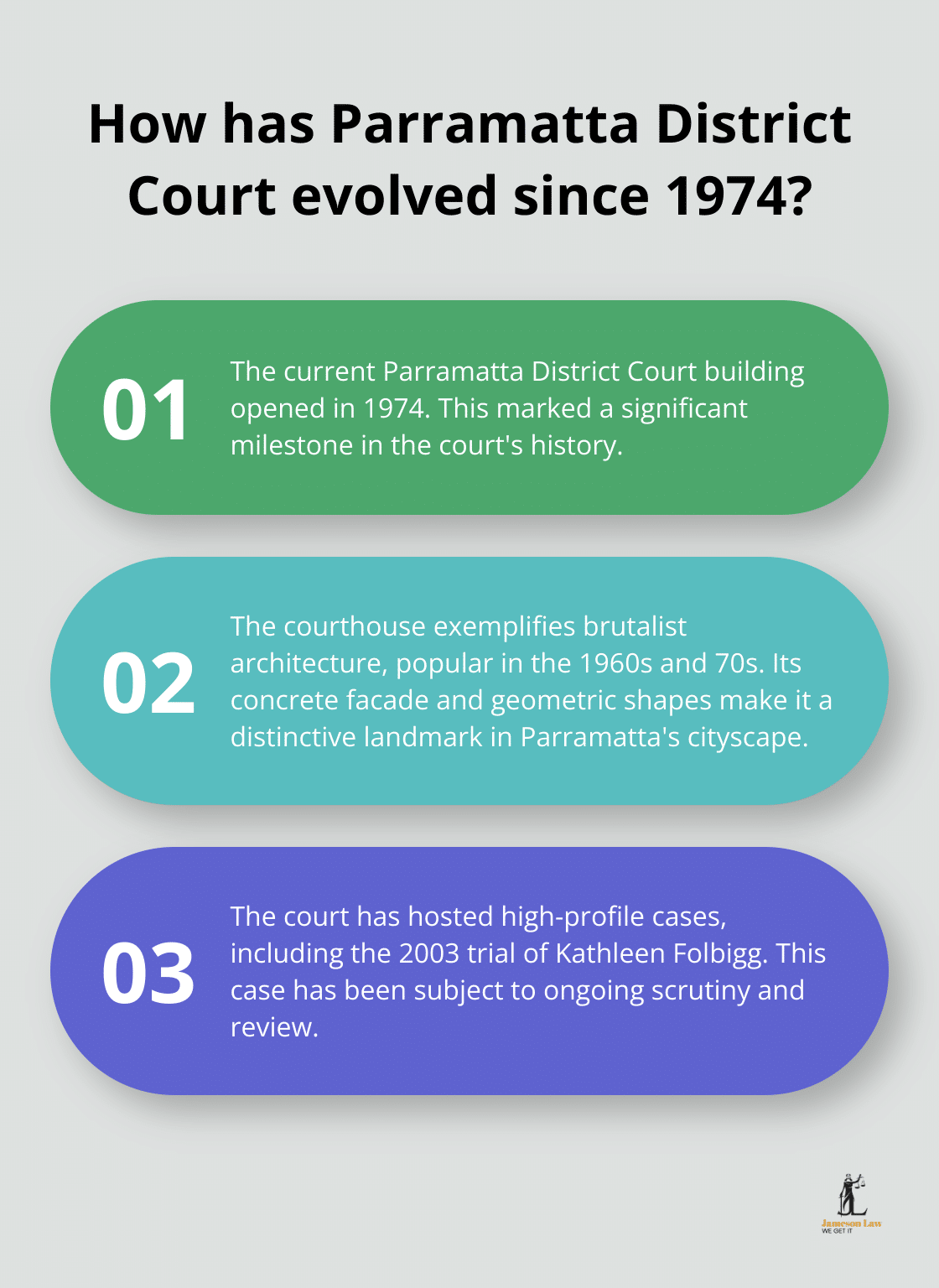
The court’s evolution mirrors the changing face of Parramatta itself. Originally housed in a modest building, the courthouse underwent several expansions and renovations to accommodate the growing population and increasing caseload. In 1974, the current courthouse building opened, marking a significant milestone in the court’s history.
Landmark Cases and Legal Impact
Over the years, Parramatta District Court has hosted numerous high-profile cases that have left an indelible mark on NSW jurisprudence. One such case was the 2003 trial of Kathleen Folbigg. This case has been subject to ongoing scrutiny and review, including a 2019 inquiry into her convictions.
Architectural Significance
The current Parramatta District Court building exemplifies brutalist architecture, a style popular in the 1960s and 70s. Its imposing concrete facade and stark geometric shapes make it a distinctive landmark in Parramatta’s cityscape. The adoption of Brutalism in Sydney was influenced by Australian architects returning from working overseas and European émigré architects, as noted in the Brutalist Project Sydney.
The building’s layout, with its multiple courtrooms and spacious waiting areas, facilitates the efficient handling of a high volume of cases. This design has proven effective in managing the court’s busy schedule and diverse caseload.
Heritage Value and Modernization
Despite its relatively young age, the Parramatta District Court building is recognized for its historical and architectural significance. In recent years, discussions have focused on preserving the building’s heritage features while modernizing its facilities to meet current needs.
The NSW government has invested in upgrading the courthouse’s technology and security systems, ensuring it remains a functional and safe environment for all users. These improvements, coupled with the building’s historical significance, create a unique blend of past and present in the NSW justice system.
As we move forward to explore the court’s structure and jurisdiction, it’s important to understand how this rich history influences the current operations and future developments of the Parramatta District Court.
What Cases Does Parramatta District Court Handle?
Criminal Jurisdiction
Parramatta District Court handles serious indictable offences. These include drug offences, sexual assault, fraud, and robbery. The court can impose sentences up to 20 years imprisonment for single offences (highlighting the gravity of cases it manages).
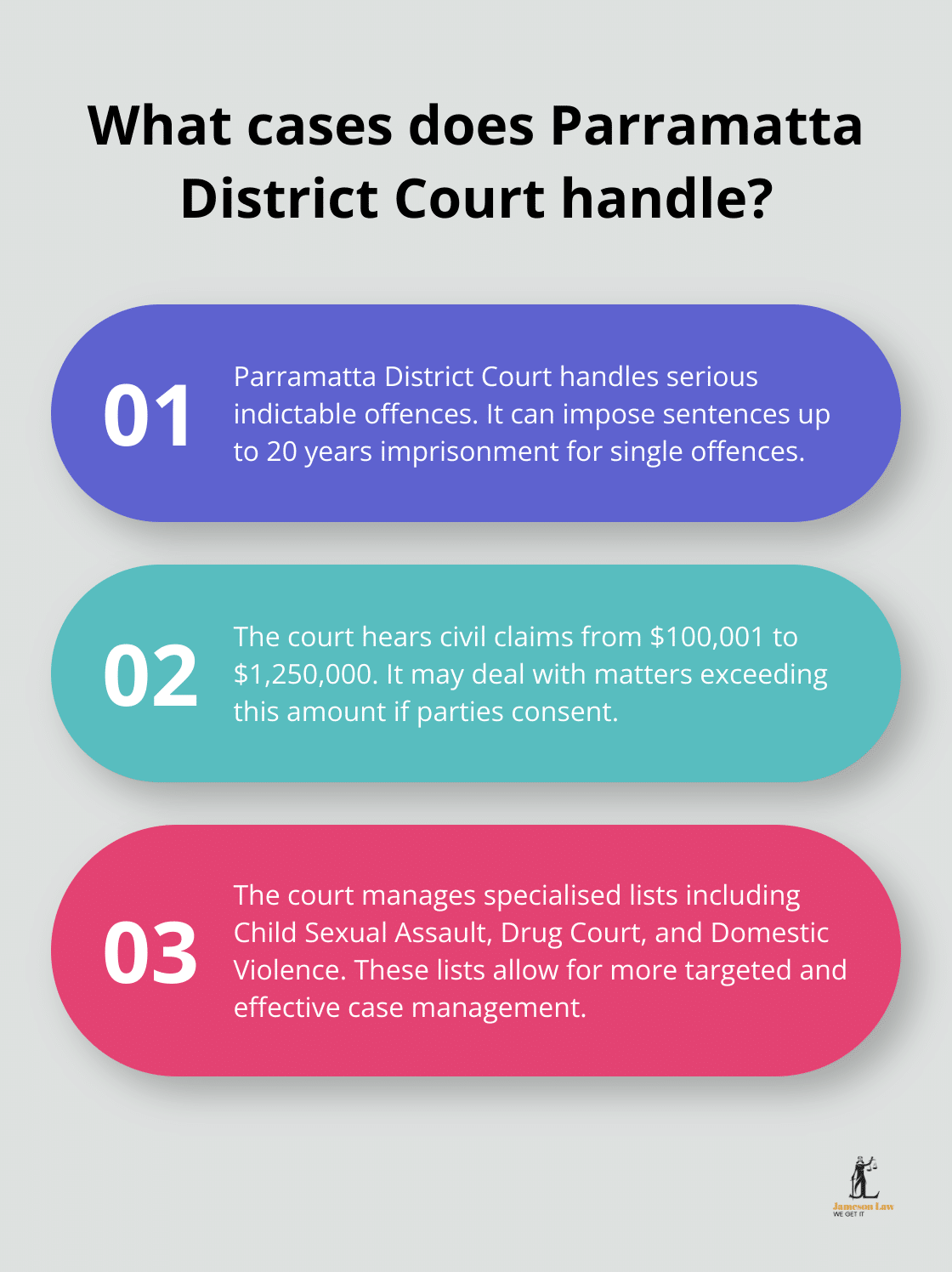
The NSW Bureau of Crime Statistics and Research provides the community with data and research about crime in NSW, offering accurate, objective, and accessible evidence and information to inform public and government decisions.
Civil Jurisdiction
On the civil side, Parramatta District Court hears claims from $100,001 to a maximum amount of $1,250,000, although it may deal with matters exceeding this amount if the parties consent.
Specialised Lists
Parramatta District Court also manages specialised lists to address specific legal areas efficiently:
- The Child Sexual Assault List: This list focuses on cases involving sexual offences against children.
- The Drug Court: It concentrates on rehabilitation for drug-dependent offenders.
- The Domestic Violence List: This list handles cases related to family and domestic violence.
These specialised lists allow for more targeted and effective case management, often resulting in better outcomes for all parties involved.
Impact on Legal Strategy
Understanding these jurisdictional nuances proves essential for effective legal representation. The court where a case is heard can significantly impact the legal strategy and potential outcomes.
Significance in Western Sydney
The Parramatta District Court’s broad jurisdiction makes it a cornerstone of justice in Western Sydney. Its ability to handle both serious criminal matters and substantial civil claims ensures that a wide range of legal issues can be addressed efficiently within the local community.
As we move forward, it’s important to understand how this court fits into the larger NSW court system and the appeal process for cases heard at Parramatta District Court.
How to Navigate Parramatta District Court
Location and Accessibility
Parramatta District Court is located at 12 George Street, Parramatta. The courthouse is easily accessible by public transport. Trains run frequently to Parramatta Station, which is a 10-minute walk from the court. For those who drive, several parking options are available nearby, including the Horwood Place Car Park.
Security Procedures
All visitors must pass through airport-style security screening upon arrival. Metal detectors and x-ray machines scan all personal belongings. To speed up this process, visitors should avoid bringing unnecessary items. Mobile phones are allowed but must be switched off in courtrooms. Cameras and recording devices are strictly prohibited without prior permission.
Courtroom Etiquette
Proper courtroom etiquette is essential. This includes:
- Standing when the judge enters or leaves
- Addressing the judge as “Your Honour”
- Speaking only when directed by court officials
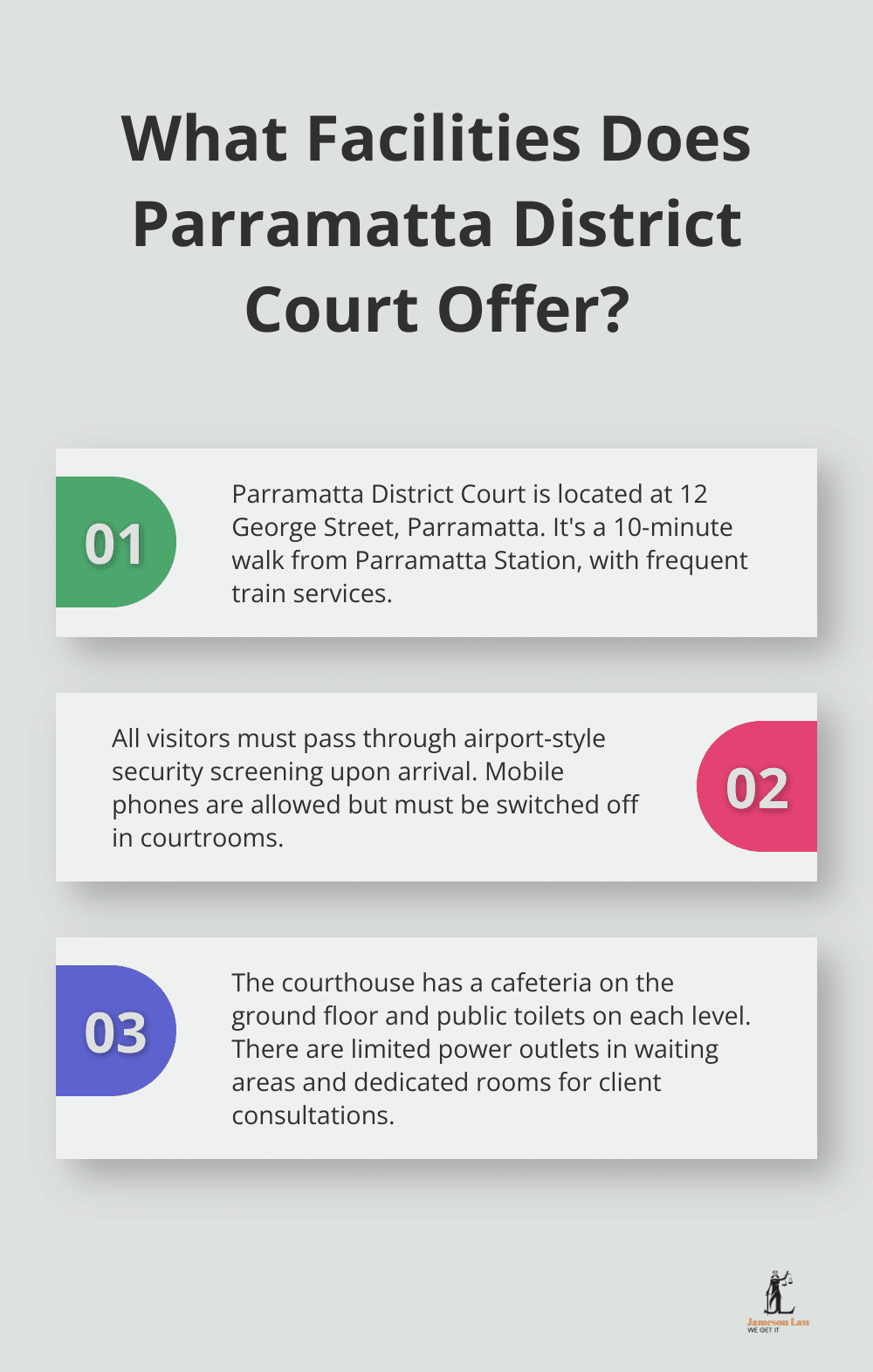
The dress code is formal – neat, tidy clothing is expected. Visitors should not wear hats, sunglasses, or clothing with offensive slogans.
Available Facilities
Parramatta District Court offers several facilities for visitors and legal professionals:
- A cafeteria on the ground floor provides refreshments and light meals
- Public toilets are available on each level
- Limited power outlets in waiting areas for work between hearings
- Dedicated rooms for client consultations (available on a first-come, first-served basis)
Accessibility for Individuals with Disabilities
The courthouse is equipped with ramps, elevators, and accessible toilets for individuals with disabilities. For specific assistance, it’s best to contact the court in advance to ensure appropriate arrangements are made.
Final Thoughts
The Parramatta District Court plays a vital role in upholding justice in New South Wales. It handles a wide range of criminal and civil matters, ensuring access to justice for residents of Western Sydney and beyond. The court’s rich history and current significance make it an integral part of the state’s legal landscape.
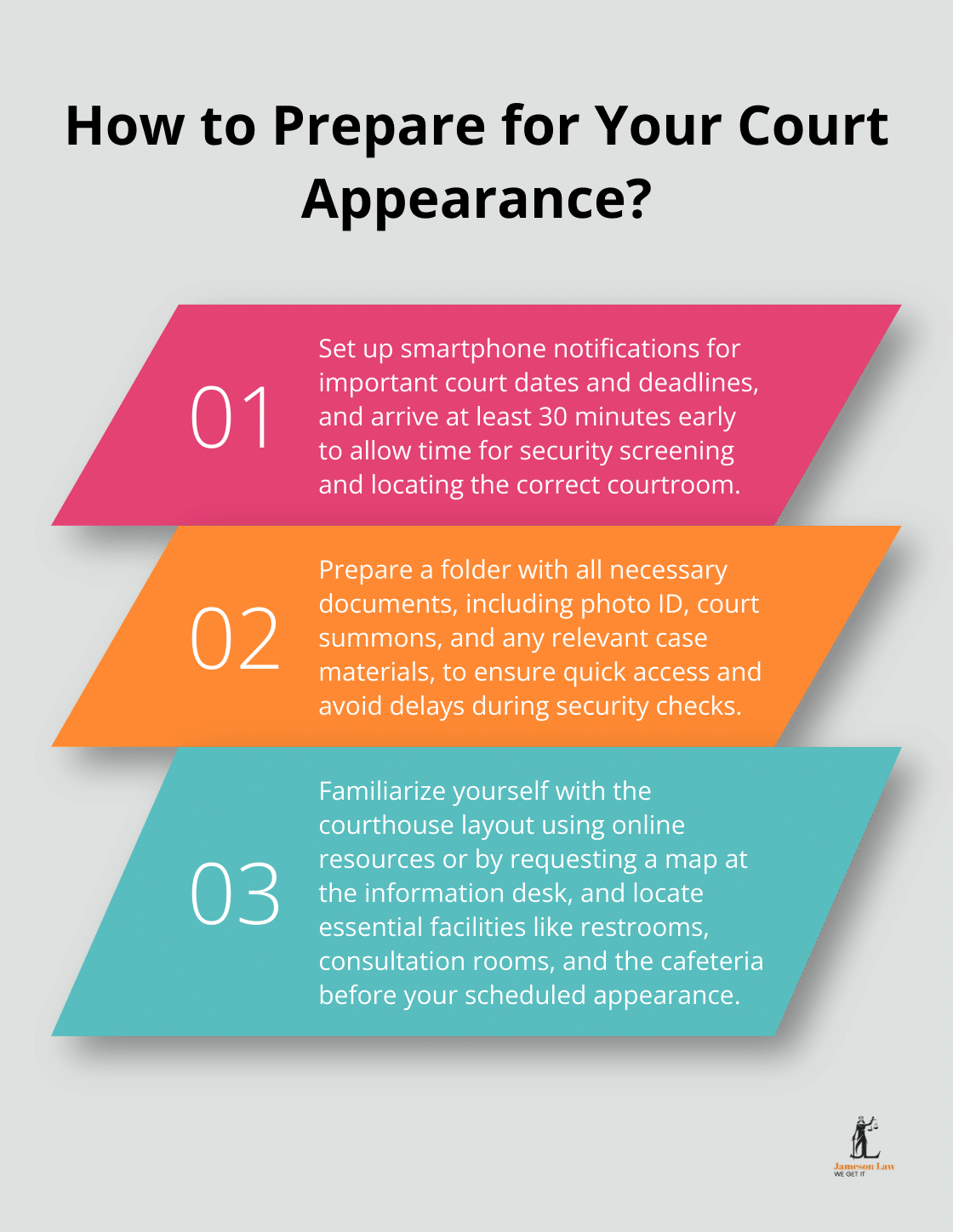
Plans for modernization and technological upgrades at the Parramatta District Court will improve efficiency and enhance the court experience. These developments will include advancements in case management systems, digital evidence presentation, and remote hearing capabilities. The NSW Courts website provides comprehensive details about court procedures, listings, and support services.
Legal professionals at Jameson Law offer expert guidance in navigating the complexities of the legal system. They ensure individuals have access to the support they need when dealing with matters at the Parramatta District Court. Understanding the workings of this important court can help demystify the legal process and promote greater access to justice for all.



